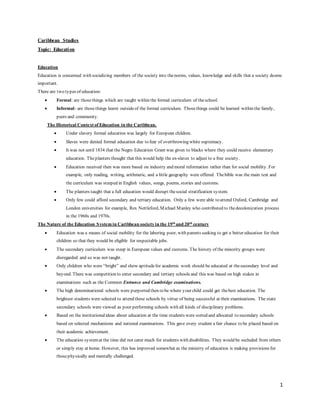
Education in the caribbean handout
- 1. 1 Caribbean Studies Topic: Education Education Education is concerned with socializing members of the society into thenorms, values, knowledge and skills that a society deems important. There are two types of education: Formal: are thosethings which are taught within the formal curriculum of theschool. Informal- are thosethings learnt outsideof the formal curriculum. Thosethings could be learned within the family, peers and community. The Historical Context of Education in the Caribbean. Under slavery formal education was largely for European children. Slaves were denied formal education due to fear of overthrowing white supremacy. It was not until 1834 that the Negro Education Grant was given to blacks where they could receive elementary education. Theplanters thought that this would help the ex-slaves to adjust to a free society. Education received then was more based on industry and moral reformation rather than for social mobility. For example, only reading, writing, arithmetic, and a little geography were offered. Thebible was the main text and the curriculum was steeped in English values, songs, poems, stories and customs. The planters taught that a full education would disrupt thesocial stratification system. Only few could afford secondary and tertiary education. Only a few were able to attend Oxford, Cambridge and London universities for example, Rex Nettleford, Michael Manley who contributed to thedecolonization process in the 1960s and 1970s. The Nature of the Education System in Caribbean society in the 19th and 20th century Education was a means of social mobility for the laboring poor, with parents seeking to get a better education for their children so that they would be eligible for respectable jobs. The secondary curriculum was steep in European values and customs. The history of the minority groups were disregarded and so was not taught. Only children who were “bright” and show aptitudefor academic work should be educated at thesecondary level and beyond. There was competition to enter secondary and tertiary schools and this was based on high stakes in examinations such as the Common Entrance and Cambridge examinations. The high denominational schools were purported then to be where your child could get thebest education. The brightest students were selected to attend these schools by virtue of being successful at their examinations. The state secondary schools were viewed as poor performing schools with all kinds of disciplinary problems. Based on the institutionalideas about education at the time students were sorted and allocated to secondary schools based on selected mechanisms and national examinations. This gave every student a fair chance to be placed based on their academic achievement. The education systemat the time did not cater much for students with disabilities. They would be secluded from others or simply stay at home. However, this has improved somewhat as the ministry of education is making provisions for thosephysically and mentally challenged.
- 2. 2 Home Schooling is more of the twentieth century where students stay at home and taught the curriculum provided that they have a tutor. Some parents utilize this opportunity because they fear that their children will be introduced to violence, sexual practices, profane language and values that are not morally acceptable in society. The Impact of EduationThen and Now to Caribbean society The purpose for colonial authorities after emancipation was to inculcate English values and customs but for the former enslaved education was and is still viewed as the route to social mobility for themselves and their offspring so that they can live a good standard of life. In the twentieth and twenty first century education is more complex and one which is mandatory for all children. Then and even now only a few can afford to send their children to tertiary institutions which would land them high paying jobs. Education facilitates social cohesion – enabling people to come together.This according to the colonial authorities then would help to preserve social stability in the society. Education then and now is a means for economic development. The inculcation of knowledge and skills will boost economic productivity.People then and even now are seen as the main source of capital. Education impacts various socio-economic groups differently. Children from the middle class are able to do better in the education systemparticularly at language than those from lower class of society. They are able to use both Patois and English more competently than lower class children due to their exposure to travel, educational toys,computers and involvement in various extra-curricular activities. Many parents prefer that their children attend denominational schools not because they want them to be inducted into the religion but more so because of discipline and moral standards which are present in these schools. Although the curriculum is wider today,there are some subjects that are genderspecific. For example, in some institutions girls are automatically assigned food and nutrition and sewing while the boys do woodwork. Girls who gravitate towards the technical drawing and automotive technology are viewed as “tom boys.” Source Mohammad, Jennifer. (2007). CAPE Caribbean Studies: An Interdisciplinary Approach. Macmillan Publishers. Questions 1. What is colonial education? 2. Describe THREE ways in which education facilitated the colonial agenda in the Caribbean. ( 20 marks) CAPE 2010.